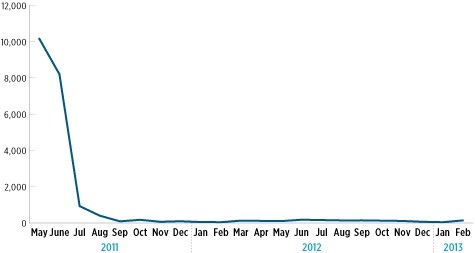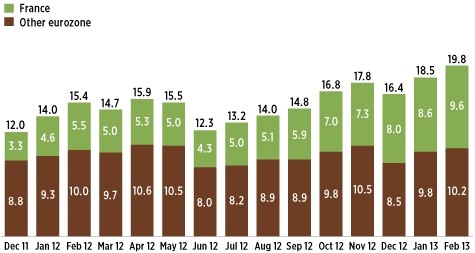ICI Viewpoints
U.S. Prime Money Market Funds’ Eurozone Holdings Remain Low and Limited in Scope
Given February’s elections in Italy and recent developments in Cyprus, questions have resurfaced about the eurozone debt crisis and how it might affect the U.S. economy. For example, in testimony before the Senate Banking Committee in February, Senator Charles Schumer (D-NY) asked Federal Reserve Chairman Ben Bernanke what exposure American financial institutions had to Italy’s debt. Bernanke suggested that indirect effects, rather than direct holdings of Italian debt, were more likely to impact the U.S. economy. In passing, however, he may have left the impression that U.S. money market funds hold Italian bank debt.
To address these questions, we examined the N-MFP holdings data that money market funds report monthly to the Securities and Exchange Commission. U.S. money market funds do not hold any Italian bank securities, nor do they hold Italian sovereign debt. In fact, the vast majority of their eurozone holdings are to entities whose ultimate parent is in France, Germany, or the Netherlands. Prime money market funds moved away from Italian private sector debt during the spring and summer of 2011, and have not returned since.
U.S. Prime Money Market Funds’ Holdings of Italian Issuers
Millions of dollars; month-end; May 31, 2011–February 28, 2013

Note: Data exclude prime money market funds not registered under the Securities Act of 1933.
Source: Investment Company Institute tabulations of data provided by Crane Data
At present, money market funds do have a very small exposure—just over $100 million—to an Illinois-based financing arm of CNH Global N.V. CNH is a manufacturer of agricultural and construction equipment; it makes tractors, backhoes, and other industrial equipment in the United States. Fund holdings in CNH are predominantly asset-backed loans to U.S. businesses. We classify these holdings as Italian because CNH is a subsidiary of Turin, Italy-based Fiat Industrial (which, incidentally, has plans to relocate its headquarters to the Netherlands). It is debatable whether this represents exposure to the Italian economy or to the U.S. economy, but it certainly is not exposure to Italian banks or Italian government debt.
As shown in the chart below, over the last six months, prime money market funds have increased their holdings of eurozone issuers: from 14.0 percent of assets in August to 19.8 percent of assets in February 2013. This increase can be explained by a rise in holdings of French assets (rising from 5.1 percent last August to 9.6 percent) and in holdings of German assets (up from 5.1 percent in August to 6.4 percent). More than 96 percent of these eurozone holdings are in France, Germany, and the Netherlands.
U.S. Prime Money Market Funds’ Holdings of Eurozone Issuers
Percentage of prime funds’ total assets; month-end; December 31, 2011–February 28, 2013

Note: Data exclude prime money market funds not registered under the Securities Act of 1933.
Source: Investment Company Institute tabulations of data provided by Crane Data
Prime Money Market Funds’ Holdings by Home Country of Issuer
February 28, 2013
| Country | Billions of dollars | Percentage of total assets |
| World total | $1,486.3 | 100% |
| Europe | 566.0 | 38.1 |
| Eurozone | 294.0 | 19.8 |
| France | 142.5 | 9.6 |
| Germany | 95.0 | 6.4 |
| Netherlands | 45.8 | 3.1 |
| Austria | 7.3 | 0.5 |
| Belgium | 2.3 | 0.2 |
| Spain | 0.8 | 0.1 |
| Luxembourg | 0.2 | 0.0 |
| Italy | 0.1 | 0.0 |
| Non-eurozone | 272.0 | 18.3 |
| Sweden | 93.3 | 6.3 |
| UK | 92.0 | 6.2 |
| Switzerland | 64.7 | 4.4 |
| Norway | 22.0 | 1.5 |
| Americas | 640.1 | 43.1 |
| USA | 457.3 | 30.8 |
| Canada | 181.3 | 12.2 |
| Chile | 1.4 | 0.1 |
| Venezuela | 0.1 | 0.0 |
| Asia and Pacific | 273.8 | 18.4 |
| Japan | 154.2 | 10.4 |
| AUS/NZ | 107.3 | 7.2 |
| Singapore | 8.6 | 0.6 |
| China | 3.2 | 0.2 |
| Korea | 0.3 | 0.0 |
| India | 0.2 | 0.0 |
| Malaysia | 0.0 | 0.0 |
| Supranational | 3.7 | 0.2 |
| Unclassified | 2.7 | 0.2 |
Note: Calculations are based on a sample of 120 funds, representing an estimated 93.3 percent of prime funds’ assets.
Source: Investment Company Institute tabulations of data provided by Crane Data
For more on money market funds, please visit ICI’s Money Market Funds Resource Center.
Emily Gallagher is an ICI assistant economist.
Chris Plantier is a senior economist in ICI’s Research Department.
